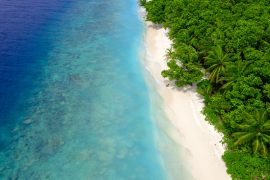The UTL has attained even greater significance in the wake of the November 2008 terror attacks in Mumbai, which revealed the easy accessibility and consequent vulnerability of India’s west coast to terrorist organisations possessing even a modicum of maritime capacity and capability. There have been unconfirmed reports that malevolent non-State State-sponsored actors such as the Lashkar-e-Taiba (LeT) planned to utilise one or more islands of the Lakshadweep group as a base from which they attack mainland India could be launched. This could well have been based upon an appreciation by the LeT that Lakshadweep, with its predominant Muslim demographic composition (belonging to the Shafi school of thought), offered easy pickings. The increase of radical Islamic activities in the Indian state of Kerala, which shares linguistic, cultural and religious affiliations with Indian citizens residing in the Lakshadweep group, has raised security concerns over the possibility of this religious radicalisation proliferating to the islands. The apparent vulnerability of Maldives, as seen from the rise of radical Islam in that country, coupled with the inclusion of Kerala in the revised “Red Corridor” that maps the wide swathe of Naxal influence, is a further cause of concern.
This above paragraph is an extract from an article published by a think tank. The article, circulated on the internet, has gone viral. The source of the article is questionable. Also, none of the claims it makes are verifiable. There are no hyperlinks attached or cited sources that one could cross-check. However, given the current circumstances, this does not come as a surprise.
-30-
Copyright©Madras Courier, All Rights Reserved. You may share using our article tools. Please don't cut articles from madrascourier.com and redistribute by email, post to the web, mobile phone or social media.Please send in your feed back and comments to [email protected]











